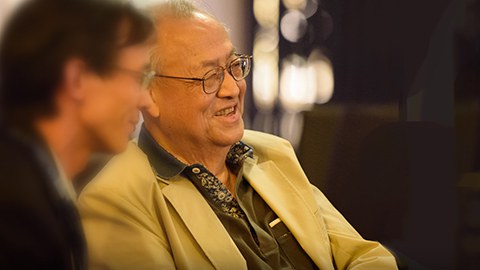Jan 17, 2018
Prof. Leon Chua, University of California, Berkeley, lectures on the age-old enigma of life at the TU Dresden

Prof. Leon Chua
The electrical engineer Prof. Leon Chua speaks about the "Missing Foundations for Complexity and Intelligence" on January 23, 2018.
How can new structures emerge spontaneously? How can disorder and chaos turn into a stable and efficient system? How can intelligence and life itself be explained? – Luminaries such as Boltzmann, Schrodinger, Turing, Prigogine, etc. have searched in vain for a missing principle of complexity that could answer these questions. Prof. Chua’s talk presents an engineering breakthrough, dubbed local activity, to this age-old enigma.
Local activity is the long-sought holy grail of complexity, the elan vital of life!
In high-tech parlance, the principle of local activity asserts that no computers, smart phones, brain-like machines, etc., can be built without using locally-active building blocks. A simple sophomore-level algorithm is available for testing whether a device is locally active, as well as for massaging the device`s parameters into a sweet spot of local activity.
Local activity is a necessary but not sufficient condition for complexity. To build a brain-like machine, and ultimately to create life itself, an enabling nano device, dubbed the memristor, must be commissioned. Together, local activity, and the memristor, are sufficient to build a universal Turing machine, including a super-intelligent cellular automata with the endearing moniker 137.
Prof. Chua gives his talk "Missing Foundations for Complexity and Intelligence" on January 23, 2018 at 4:40 p.m. in the Hörsaalzentrum of the TU Dresden (Bergstr. 64), lecture hall 3. The lecture is in English. All interested are cordially invited to the lecture.
Information about Prof. Chua:
Leon O. Chua is Professor Emeritus at the Department of Electrical Engineering and Computer Science at the University of California, Berkeley. He is an internationally well-known pioneer in nonlinear circuits, Cellular Neural Networks and chaos. His work in these areas has been recognized internationally through 7 major awards, including the IEEE Gustav Kirchhoff Award, 7 USA patents, and 16 honorary doctorates. He is also a recipient of the top 15 cited authors in Engineering Award. Leon Chua was elected a foreign member of the European Academy of Sciences (Academia Europea). He is a foreign member of the Hungarian Academy of Science and John Simon Guggenheim fellow. He has published more than 500 papers in reviewed scientific journals and 8 books. Leon Chua was awarded a TUM affiliated Distinguished Professor at the Technische Universität München in 2011.
